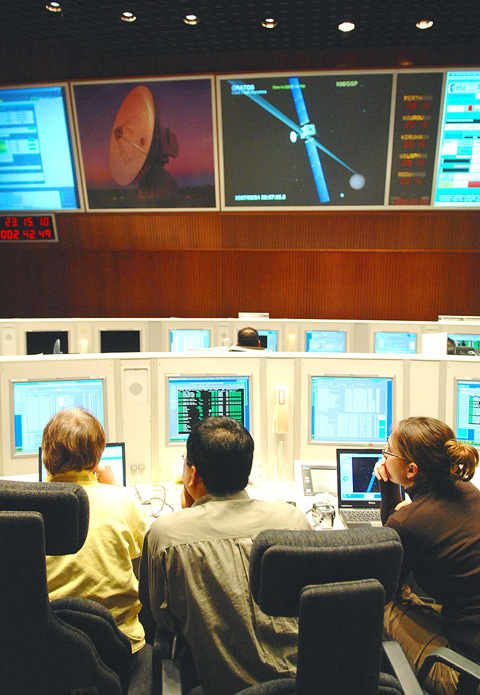A European spacecraft racing through the asteroid belt skimmed past a 10km space rock on Friday to carry out its first scientific work in a decade-long trek into the Solar System, mission controllers said.
In a minutely choreographed operation, the 1 billion euro (US$1.45 billion) unmanned probe Rosetta — launched in 2004 by the European Space Agency (ESA) — came within about 800km of an unusual asteroid called (2867) Steins, a distance that is a hair’s breadth in space terms.
Its goal was to get rare, close-up photographs and surface scanning of an asteroid, part of the intriguing debris left over from the building of the Solar System.

PHOTO: AP
The encounter took place 360 million kilometers from home as Rosetta zipped through the asteroid belt between Mars and Jupiter, on its way to a rendezvous with Comet 67P/Churyumov-Gerasimenko in 2014.
Rosetta switched on 11 instruments to scan the rock as it flashed by at 8.6kps, or 30,720kph, using an optical navigation system to keep automatically on course, ESA said in a live blog of the operation. The spacecraft had been instructed to make a flip so as to get the best view of the asteroid and this caused a planned break in radio contact of around 80 minutes.
When a NASA ground station relayed the message that it had picked up signals from Rosetta after the flyby, the entire team at mission control “let out a huge cheer,” blog editor Daniel Scuka wrote.
Rosetta is four and a half years into a 6.5 billion-kilometer journey that will cause it to loop Earth three times and Mars once, using the planet’s gravity as a slingshot to build up speed so that it can make the meeting with the comet.
It had been roused from hibernation for the meeting with Steins.
Asteroids are a source of deep scientific interest because of the clues they offer into the physical composition of the planets and the impact of the harsh environment of space.
Understanding their structure, density, orbit and spin is also useful for helping Earth to defend itself against any rogue rock that is deflected onto a collision course with our planet. Scientists will have to determine whether it will be safer to nudge any potential threat out of harm’s way or to blow it up, and accurate knowledge will be crucial for making this decision.
Steins falls into a so-called Type E asteroid, composing mainly silicates and basalts, but about which very little is known in detail. In addition to scanning Steins’ shape and reflectivity with powerful cameras, Rosetta used infrared spectrometry to get a fix on the chemical composition of its surface and monitored whether the asteroid was leaving any dust or emitting gas.
The first pictures of the flyby were expected to arrive back at mission control in Darmstadt, Germany, at about noon yesterday, followed by data from other instruments.

In the sweltering streets of Jakarta, buskers carry towering, hollow puppets and pass around a bucket for donations. Now, they fear becoming outlaws. City authorities said they would crack down on use of the sacred ondel-ondel puppets, which can stand as tall as a truck, and they are drafting legislation to remove what they view as a street nuisance. Performances featuring the puppets — originally used by Jakarta’s Betawi people to ward off evil spirits — would be allowed only at set events. The ban could leave many ondel-ondel buskers in Jakarta jobless. “I am confused and anxious. I fear getting raided or even

POLITICAL PATRIARCHS: Recent clashes between Thailand and Cambodia are driven by an escalating feud between rival political families, analysts say The dispute over Thailand and Cambodia’s contested border, which dates back more than a century to disagreements over colonial-era maps, has broken into conflict before. However, the most recent clashes, which erupted on Thursday, have been fueled by another factor: a bitter feud between two powerful political patriarchs. Cambodian Senate President and former prime minister Hun Sen, 72, and former Thai prime minister Thaksin Shinawatra, 76, were once such close friends that they reportedly called one another brothers. Hun Sen has, over the years, supported Thaksin’s family during their long-running power struggle with Thailand’s military. Thaksin and his sister Yingluck stayed

Kemal Ozdemir looked up at the bare peaks of Mount Cilo in Turkey’s Kurdish majority southeast. “There were glaciers 10 years ago,” he recalled under a cloudless sky. A mountain guide for 15 years, Ozdemir then turned toward the torrent carrying dozens of blocks of ice below a slope covered with grass and rocks — a sign of glacier loss being exacerbated by global warming. “You can see that there are quite a few pieces of glacier in the water right now ... the reason why the waterfalls flow lushly actually shows us how fast the ice is melting,” he said.

RESTRUCTURE: Myanmar’s military has ended emergency rule and announced plans for elections in December, but critics said the move aims to entrench junta control Myanmar’s military government announced on Thursday that it was ending the state of emergency declared after it seized power in 2021 and would restructure administrative bodies to prepare for the new election at the end of the year. However, the polls planned for an unspecified date in December face serious obstacles, including a civil war raging over most of the country and pledges by opponents of the military rule to derail the election because they believe it can be neither free nor fair. Under the restructuring, Myanmar’s junta chief Min Aung Hlaing is giving up two posts, but would stay at the